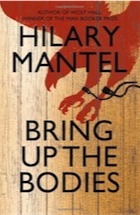Bookies William Hill have declared novelist Hilary Mantel, winner
of the Costa Novel Award with Bring
Up the Bodies, (her sequel to Wolf
Hall) , as odds-on favourite
at 5-4..Having won the Costa prize for fiction, she
is in line to win the Costa overall book of the year. Very good luck to her.
The media will be vibrating this week with informed comments about and reviews of this book.
But in this highly personal series here on
Life Twice Tasted Bring Up The Bodies happens to be one of the books which I
listened to when ill after Christmas in unabridged audio form.
My present project is to embark on a series of Writers’ Notes inspired by a focused audio-reading of these books. I have posted Writers’ Notes on earlier books (see below).
Here are my notes on Bring Up The Bodies.
Research;
Inevitably one must
comment on the wide-ranging deeply investgated research that underpins this
novel. She has absorbed the complex research in an all-ecompassing fashion,
almost magically transforming it into flowing prose.
Style
Every paragraph
densely - sometimes poetically - worked to a point of transparency with the aim
of giving us access to a formidable clever, self-consciously powerful man.
Evident familiarity with the documents, literature and linguistic rhythms of
Tudor history renders the prose authentic and peculiarly modern at the same
time. This shows a touch of genius. The speech –extensive use of diaplogue p
renders the reality.
Point of View
Mantel very
cleverly manages to tell the story in the first person dressed up in the third
persom. Working from the inside of his mind she refers to Thomas Cromwell as he, or he – Cromwell. It is an intimate
and very subjective characterisation dressed up as an objective account by the
use of he. So very clever.
Character
I read somewhere an
opinion that this writer was in love with her subject. To me it is rather she is her subject and that is why the continuous
narrative rendered through the mind of Cromwell works so well. Her affection
for the dour Cromwell sings gracefully out of every line, every page. The
writer expresses the subtle politics of the court, the continent of Europe and those times.
So we are treated
to Cromwell’s own subtle take on his obstinate loyalty to the selfish, quixotic
Henry the Eighth, his cold passion, his political and psychological insight
into court politics, his high intelligence, his puppeteer’s control over the
objects of his power – particularly
Henry’s current and future Queens Anne Boleyn and her family and Anne Seymour and the Seymours.
His battle with,
and ultimate revenge on, the manipulative Boleyn (formerly his ally) is the dramatic thread in the
narrative. Mantel’s account through
Cromwell’s mind of the imprisonment and execution of Anne Boleyn is the most
gruesome piece of writing I have ever read.
So, it seems we
should dislike Thomas, but the quality of the imagination and the writing here ensures
rather that we understand, even like him. We get to see him as a dour but
honest man, pragmatic with regard to the power of his role. But his dourness is
shot through with a sense of irony. Witty asides demonstrate his insight into
the machinations of those around him. His coolness is balanced with his clear
fondness for his much milder and quieter son and for his political protégé Ralph Sadler whose house (shared with his wife
Helen, also one of Thomas’s protégées, is wonderfully and intricately rendered here –
a kind of loving evocation of a life which contrasts with his own lonely home
life.
Thoman is no cold
shallow man. We feel with as he mourns for his wife and two little daughters.
And we share with him his anger at the cruel execution of his mentor Cardinal
Wolsey. The expiation of this anger, and vengeance on those who plotted his
death, is another strong strand in this narrative.
He treats doors as an enemy.
He slides his hands into his sleeves
Passage where an
old knight advises to the young about jousting Very detailed. and full of pathetic
tragic commitment
What have I learned from this book?
- An exhaustively researched, beautifully written and constructed novel set in a certain time space does not have to be lumped into a genre called The Historical Novel. It does not ‘date’.
- The rich possibiloties of in depth use of that very close third person
- The possibility of
showing unlikeable characteristics in a likeable way
- Showing power positions through well conceived dialogue
- Best to challenge oneself and be ambitious and not ‘serve’ the market.
Last note; Don't care for the cover - dour and unexciting. Other editions have better covers, But does the cover really matter?

I blazed through Bring Up the Bodies, the sequel to Man Booker winner Wolf Hall. I have never reached for historical fiction, but Mantel's prose has me spellbound. This second book takes place in a much shorter time frame compared to Wolf Hall, and for that reason I think the pace of the story moves much more quickly. As much as I loved Wolf Hall, I must admit that I think I enjoyed reading Bring Up the Bodies even more.
ReplyDelete